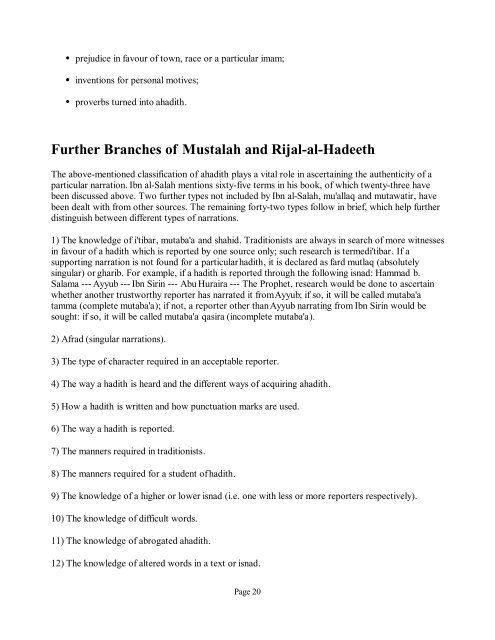Rules Governing The Criticism Of Hadith - Islam House
Rules Governing The Criticism Of Hadith - Islam House
Rules Governing The Criticism Of Hadith - Islam House
Create successful ePaper yourself
Turn your PDF publications into a flip-book with our unique Google optimized e-Paper software.
prejudice in favour of town, race or a particular imam;<br />
inventions for personal motives;<br />
proverbs turned into ahadith.<br />
Further Branches of Mustalah and Rijal-al-Hadeeth<br />
<strong>The</strong> above-mentioned classification of ahadith plays a vital role in ascertaining the authenticity of a<br />
particular narration. Ibn al-Salah mentions sixty-five terms in his book, of which twenty-three have<br />
been discussed above. Two further types not included by Ibn al-Salah, mu'allaq and mutawatir, have<br />
been dealt with from other sources. <strong>The</strong> remaining forty-two types follow in brief, which help further<br />
distinguish between different types of narrations.<br />
1) <strong>The</strong> knowledge of i'tibar, mutaba'a and shahid. Traditionists are always in search of more witnesses<br />
in favour of a hadith which is reported by one source only; such research is termed i'tibar. If a<br />
supporting narration is not found for a particular hadith, it is declared as fard mutlaq (absolutely<br />
singular) or gharib. For example, if a hadith is reported through the following isnad: Hammad b.<br />
Salama --- Ayyub --- Ibn Sirin --- Abu Huraira --- <strong>The</strong> Prophet, research would be done to ascertain<br />
whether another trustworthy reporter has narrated it from Ayyub; if so, it will be called mutaba'a<br />
tamma (complete mutaba'a); if not, a reporter other than Ayyub narrating from Ibn Sirin would be<br />
sought: if so, it will be called mutaba'a qasira (incomplete mutaba'a).<br />
2) Afrad (singular narrations).<br />
3) <strong>The</strong> type of character required in an acceptable reporter.<br />
4) <strong>The</strong> way a hadith is heard and the different ways of acquiring ahadith.<br />
5) How a hadith is written and how punctuation marks are used.<br />
6) <strong>The</strong> way a hadith is reported.<br />
7) <strong>The</strong> manners required in traditionists.<br />
8) <strong>The</strong> manners required for a student of hadith.<br />
9) <strong>The</strong> knowledge of a higher or lower isnad (i.e. one with less or more reporters respectively).<br />
10) <strong>The</strong> knowledge of difficult words.<br />
11) <strong>The</strong> knowledge of abrogated ahadith.<br />
12) <strong>The</strong> knowledge of altered words in a text or isnad.<br />
Page 20

















